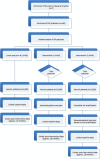The Diabetes Care Project: an Australian multicentre, cluster randomised controlled trial [study protocol]
- PMID: 24359432
- PMCID: PMC3883483
- DOI: 10.1186/1471-2458-13-1212
The Diabetes Care Project: an Australian multicentre, cluster randomised controlled trial [study protocol]
Abstract
Background: Diabetes mellitus is an increasingly prevalent metabolic disorder that is associated with substantial disease burden. Australia has an opportunity to improve ways of caring for the growing number of people with diabetes, but this may require changes to the way care is funded, organised and delivered. To inform how best to care for people with diabetes, and to identify the extent of change that is required to achieve this, the Diabetes Care Project (DCP) will evaluate the impact of two different, evidence-based models of care (compared to usual care) on clinical quality, patient and provider experience, and cost.
Methods/design: The DCP uses a pragmatic, cluster randomised controlled trial design. Accredited general practices that are situated within any of the seven Australian Medicare Locals/Divisions of General Practice that have agreed to take part in the study were invited to participate. Consenting practices will be randomly assigned to one of three treatment groups for approximately 18 to 22 months: (a) control group (usual care); (b) Intervention 1 (which tests improvements that could be made within the current funding model, facilitated through the use of an online chronic disease management network); or (c) Intervention 2 (which includes the same components as Intervention 1, as well as altered funding to support voluntary patient registration with their practice, incentive payments and a care facilitator). Adult patients who attend the enrolled practices and have established (≥12 month's duration) type 1 diabetes mellitus or newly diagnosed or established type 2 diabetes mellitus are invited to participate. Multiple outcomes will be studied, including changes in glycosylated haemoglobin (primary outcome), changes in other biochemical and clinical metrics, incidence of diabetes-related complications, quality of life, clinical depression, success of tailored care, patient and practitioner satisfaction, and budget sustainability.
Discussion: This project responds to a need for robust evidence of the clinical and economic effectiveness of coordinated care for the management of diabetes in the Australian primary care setting. The outcomes of the study will have implications not only for diabetes management, but also for the management of other chronic diseases, both in Australia and overseas.
Trial registration: Australian New Zealand Clinical Trials Registry (ACTRN12612000363886); World Health Organisation (U1111-1128-0481).
Figures


References
-
- Tong B, Stevenson C. Comorbidity of cardiovascular disease, diabetes and chronic kidney disease in Australia. Australian Institute of Health & Welfare: Canberra; 2007. (Cardiovascular Disease Series no. 28. Cat. no. CVD 37).
-
- Australian Institute of Health & Welfare (AIHW) Health service use. AIHW; 2012. http://www.aihw.gov.au/diabetes/health-service-use/ (accessed 21 September 2012)
-
- Colagiuri S, Colagiuri R, Conway B, Grainger D, Davey P. DiabCo$t Australia: assessing the burden of type 2 diabetes in Australia. Diabetes Australia: Canberra; 2003.
-
- Colagiuri S, Brnabic A, Gomez M, Fitzgerald B, Buckley A, Colagiuri R. DiabCo$t Australia type 1: assessing the burden of type 1 diabetes in Australia. Canberra: Diabetes Australia; 2009.
Publication types
MeSH terms
Substances
LinkOut - more resources
Full Text Sources
Other Literature Sources
Medical
Miscellaneous

